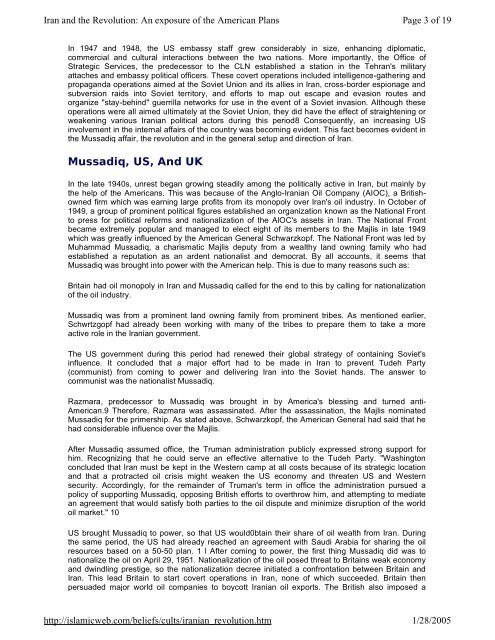Collection Of Articles (Refuting Shia) - Enjoy Islam
Collection Of Articles (Refuting Shia) - Enjoy Islam
Collection Of Articles (Refuting Shia) - Enjoy Islam
You also want an ePaper? Increase the reach of your titles
YUMPU automatically turns print PDFs into web optimized ePapers that Google loves.
Iran and the Revolution: An exposure of the American Plans<br />
Page 3 of 19<br />
In 1947 and 1948, the US embassy staff grew considerably in size, enhancing diplomatic,<br />
commercial and cultural interactions between the two nations. More importantly, the <strong>Of</strong>fice of<br />
Strategic Services, the predecessor to the CLN established a station in the Tehran's military<br />
attaches and embassy political officers. These covert operations included intelligence-gathering and<br />
propaganda operations aimed at the Soviet Union and its allies in Iran, cross-border espionage and<br />
subversion raids into Soviet territory, and efforts to map out escape and evasion routes and<br />
organize "stay-behind" guerrilla networks for use in the event of a Soviet invasion. Although these<br />
operations were all aimed ultimately at the Soviet Union, they did have the effect of straightening or<br />
weakening various Iranian political actors during this period8 Consequently, an increasing US<br />
involvement in the internal affairs of the country was becoming evident. This fact becomes evident in<br />
the Mussadiq affair, the revolution and in the general setup and direction of Iran.<br />
Mussadiq, US, And UK<br />
In the late 1940s, unrest began growing steadily among the politically active in Iran, but mainly by<br />
the help of the Americans. This was because of the Anglo-Iranian Oil Company (AIOC), a Britishowned<br />
firm which was earning large profits from its monopoly over Iran's oil industry. In October of<br />
1949, a group of prominent political figures established an organization known as the National Front<br />
to press for political reforms and nationalization of the AlOC's assets in Iran. The National Front<br />
became extremely popular and managed to elect eight of its members to the Majlis in late 1949<br />
which was greatly influenced by the American General Schwarzkopf. The National Front was led by<br />
Muhammad Mussadiq, a charismatic Majlis deputy from a wealthy land owning family who had<br />
established a reputation as an ardent nationalist and democrat. By all accounts, it seems that<br />
Mussadiq was brought into power with the American help. This is due to many reasons such as:<br />
Britain had oil monopoly in Iran and Mussadiq called for the end to this by calling for nationalization<br />
of the oil industry.<br />
Mussadiq was from a prominent land owning family from prominent tribes. As mentioned earlier,<br />
Schwrtzgopf had already been working with many of the tribes to prepare them to take a more<br />
active role in the Iranian government.<br />
The US government during this period had renewed their global strategy of containing Soviet's<br />
influence. It concluded that a major effort had to be made in Iran to prevent Tudeh Party<br />
(communist) from coming to power and delivering Iran into the Soviet hands. The answer to<br />
communist was the nationalist Mussadiq.<br />
Razmara, predecessor to Mussadiq was brought in by America's blessing and turned anti-<br />
American.9 Therefore, Razmara was assassinated. After the assassination, the Majlis nominated<br />
Mussadiq for the primership. As stated above, Schwarzkopf, the American General had said that he<br />
had considerable influence over the Majlis.<br />
After Mussadiq assumed office, the Truman administration publicly expressed strong support for<br />
him. Recognizing that he could serve an effective alternative to the Tudeh Party. "Washington<br />
concluded that Iran must be kept in the Western camp at all costs because of its strategic location<br />
and that a protracted oil crisis might weaken the US economy and threaten US and Western<br />
security. Accordingly, for the remainder of Truman's term in office the administration pursued a<br />
policy of supporting Mussadiq, opposing British efforts to overthrow him, and attempting to mediate<br />
an agreement that would satisfy both parties to the oil dispute and minimize disruption of the world<br />
oil market." 10<br />
US brought Mussadiq to power, so that US would0btain their share of oil wealth from Iran. During<br />
the same period, the US had already reached an agreement with Saudi Arabia for sharing the oil<br />
resources based on a 50-50 plan. 1 l After coming to power, the first thing Mussadiq did was to<br />
nationalize the oil on April 29, 1951. Nationalization of the oil posed threat to Britains weak economy<br />
and dwindling prestige, so the nationalization decree initiated a confrontation between Britain and<br />
Iran. This lead Britain to start covert operations in Iran, none of which succeeded. Britain then<br />
persuaded major world oil companies to boycott Iranian oil exports. The British also imposed a<br />
http://islamicweb.com/beliefs/cults/iranian_revolution.htm<br />
1/28/2005
















